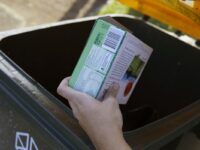New research reveals that 84 per cent of Aussies are doing their part to make online shopping more sustainable, from prioritising recycling to shirking impulse buys.
The findings were derived from a survey commissioned by parcel delivery service CouriersPlease which sought to glean the rates of sustainable choices made by consumers while shopping online.
Recycling came out as the most popular environmentally friendly choice among respondents, with 47 per cent saying they recycle their product and parcel packaging. Avoiding impulse buys and re-using and re-wearing items multiple times came out as the equal second most favoured green choice, chosen by 34 per cent.
In addition, 34 per cent of the respondents sometimes or always shop at retailers boasting sustainably sourced fabrics and ethical labour practices, with 10 per cent exclusively making that choice. However, only 29 per cent return items in the same satchel they arrived in while 20 per cent say they return unwanted items rather than keeping them unused or disposing of them.
The CouriersPlease survey also found that the older the shopper, the more likely they are to recycle their packaging, with 56 per cent of over-50s doing so, compared with just 36 per cent of under-30s, while 43 per cent aged 31-50 make the effort.
However, the younger the shopper the more likely they are to choose ethical or sustainable retailers and return items in the same satchel they arrived in, to save on packaging. In addition, 45 per cent of Gen-Z sometimes or always choose ethical or sustainable retailers, compared with just 25 per cent of over-50s. Meanwhile, 36 per cent of Gen-Z also return items in the same satchel, compared with 27 per cent and 25 per cent of 31-50s and over-50s respectively.
CouriersPlease CEO Richard Thame said that the figures showcase the rise of sustainability concerns for all Aussies, with a study revealing Australians are more worried about climate change than most other issues.
“What’s also fascinating is the age demographic breakdowns of sustainable habits. While climate change concerns are often considered more important to younger Aussies, our data shows that over-50s still lead the pack in some aspects,” Thame said.
“This speaks to the power of habit and even to infrastructure,” Thame added. “While 95 per cent of Australian households boast access to waste and recycling kerbside collection services, much of the country adopted curbside collection for recycling in the 80s and 90s which could mean that older Australians may simply have had more time to adapt when it comes to household recycling.”
Among the mainland Aussie states, WA shoppers shirk impulse buys the most and correctly dispose of packaging, with 40 per cent prioritising the reuse of items over impulse purchases, and 53 per cent recycling their packaging. Queensland shoppers were the second most likely to recycle with 49 per cent making the effort to correctly dispose of packaging.
“Given a decade-long renewed focus on recycling across Western Australia, it’s unsurprising the state is leading the sustainability charge in some respects,” Thame commented. “Waste disposal across Western Australia fell by 24 per cent on a per capita basis according to the Waste Avoidance and Resource Recovery Strategy for 2030, which was the largest fall in waste disposal nationally in 2017.”















